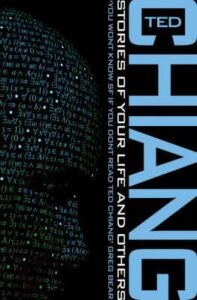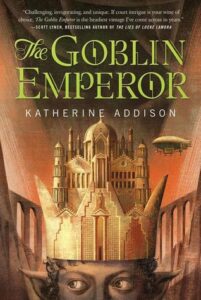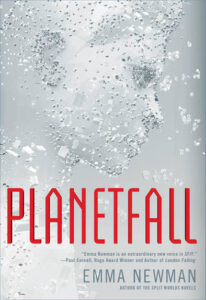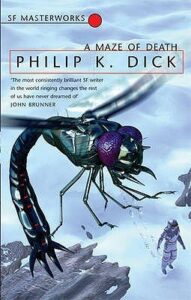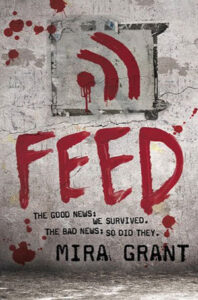 Feed, Mira Grant
Feed, Mira Grant
I read Feed for the first time a few summers ago, and enjoyed it enough that it stuck in my head. At the time, I think I found the contagion aspect of it pretty horrible; I was very much more anxious then, and the idea of a cold curing virus combining with a cancer killing microbe to cause a zombie rising — ugh, it just gave me chills. This time, though, it wasn’t as much of a focus for me: it was just part of the story, and not even necessarily the major part. There’s still something profoundly horrible about the idea of carrying the sleeping contagion in your body all your life, constantly needing to be tested in case the virus levels are shooting up, constantly needing to be afraid of your own body and the people around you; I’m not saying that aspect isn’t well done, because it definitely is and that discomfort colours the whole book.
But I was also able to enjoy the humour, the banter, and the thriller aspect: the political race which Georgia and her team get themselves involved in, the bonds between the characters and the way they bend and break under pressure, the whole world built after the zombie apocalypse has failed to wipe out humanity. I really appreciated the way it dealt with issues like people avoiding physical contact, side effects of the virus like George’s eye dilation, the effect on policy and public life in the US. And I appreciated the presidential race, much as I don’t feel like it could be written right now.
It’s not so much the bad guy; you can see him in current American politics, larger than life and twice as scary. But the sympathetic, tolerant, relatable family man Republican… none of the Republican candidates felt anything like that. It feels like a kind of politics that’s out of reach right now, because the bad guy is all we’ve got, and we can see that more moderate politics isn’t winning people over. It was so weird reading about this fictional presidential race, with plenty of high stakes in its own way, but comparing it to the current presidential race and its demagogues… I kept thinking that Senator Ryman couldn’t be Republican, because he couldn’t stand with the things the Republican party is saying and condoning right now.
Which is probably an odd perspective to have on a zombie book from a few years ago, but that’s the joy of rereading or reading older books; you get whole new perspectives.
Lest I sound like the politics is the only interesting aspect, I was also immensely caught up in the relationship between Shaun and Georgia. Their co-dependence, their ability to cover for each other’s weak points, the way they worked together — and especially the last few pages of the penultimate section of the book. Gah. I forgot that this book actually really gripped my heart strings, and it did so doubly this time.
In a way, I like Feed as a standalone novel. The emotional arc of the characters is devastating, but where the story ends leaves you some room to wonder without being agonising; the political situation was never really the key thing for me; the zombie situation is at a fairly steady-state, or so it feels.
But then, I also want to know what happens next.
Rating: 4/5
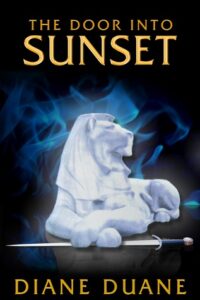 The Door into Sunset, Diane Duane
The Door into Sunset, Diane Duane
